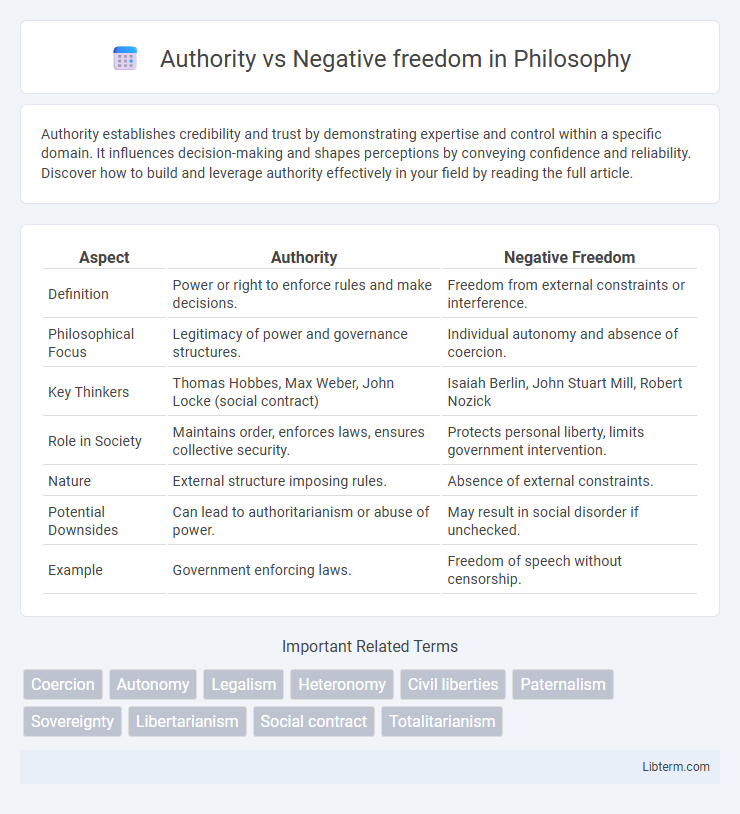Authority establishes credibility and trust by demonstrating expertise and control within a specific domain. It influences decision-making and shapes perceptions by conveying confidence and reliability. Discover how to build and leverage authority effectively in your field by reading the full article.
Table of Comparison
| Aspect | Authority | Negative Freedom |
|---|---|---|
| Definition | Power or right to enforce rules and make decisions. | Freedom from external constraints or interference. |
| Philosophical Focus | Legitimacy of power and governance structures. | Individual autonomy and absence of coercion. |
| Key Thinkers | Thomas Hobbes, Max Weber, John Locke (social contract) | Isaiah Berlin, John Stuart Mill, Robert Nozick |
| Role in Society | Maintains order, enforces laws, ensures collective security. | Protects personal liberty, limits government intervention. |
| Nature | External structure imposing rules. | Absence of external constraints. |
| Potential Downsides | Can lead to authoritarianism or abuse of power. | May result in social disorder if unchecked. |
| Example | Government enforcing laws. | Freedom of speech without censorship. |
Understanding Authority: Definition and Types
Authority refers to the legitimate power or right to give orders, make decisions, and enforce obedience within a social or organizational structure. It encompasses various types, including traditional authority based on customs and heritage, charismatic authority derived from an individual's personal qualities, and legal-rational authority grounded in established laws and rules. Understanding these distinctions is essential for grasping how authority influences individual and collective freedom, especially when contrasted with the concept of negative freedom, which emphasizes freedom from external constraints.
The Concept of Negative Freedom Explained
Negative freedom, often defined as the absence of external interference or constraints, emphasizes an individual's right to act without coercion from authorities or others. This concept contrasts with authority-based frameworks where power structures impose rules that may limit personal autonomy. By prioritizing non-interference, negative freedom supports personal liberty as freedom from domination rather than freedom to achieve certain outcomes.
Historical Perspectives on Authority and Negative Freedom
Historical perspectives on authority reveal its roots in social contracts and governance structures designed to maintain order and protect communal interests, as seen in the philosophies of Hobbes, Locke, and Rousseau. Negative freedom, emphasized by thinkers like Isaiah Berlin, historically centers on the absence of external constraints, enabling individuals to act without interference from authority. The evolving tension between authority and negative freedom reflects broader debates on balancing state control with personal liberty throughout political history.
Philosophical Foundations: Hobbes, Locke, and Mill
Thomas Hobbes emphasizes authority as essential to prevent societal chaos, arguing that a powerful sovereign ensures peace and security through social contract theory. John Locke advocates for limited authority, highlighting natural rights and the protection of life, liberty, and property, which supports a government constrained by consent to safeguard individual freedom. John Stuart Mill champions negative freedom, asserting that individuals should be free from interference unless harm to others occurs, prioritizing personal liberty while limiting authoritative control.
The Tension Between Authority and Individual Autonomy
The tension between authority and individual autonomy centers on the balance of power where authority enforces rules that limit negative freedom, defined as freedom from external constraints. Philosophers like Isaiah Berlin emphasize that excessive authority can infringe on personal liberty by restricting individual choices and self-determination. This conflict underscores ongoing debates in political theory about the extent to which governments or institutions should impose regulations without undermining the individual's right to act freely.
Social Contracts: Balancing Order and Liberty
Social contracts establish a framework where authority enforces rules to maintain social order while protecting individual negative freedom--the absence of external constraints on personal actions. This balance ensures that authority does not overreach, preserving citizens' autonomy by limiting governmental power to what is necessary for collective security. Effective social contracts create a stable society where liberty is upheld through mutual consent and restrained authority.
Authority’s Role in Limiting Negative Freedom
Authority plays a crucial role in limiting negative freedom by imposing necessary restrictions to maintain social order and protect collective interests. Governmental regulations, such as laws against theft or violence, restrict individual liberties to prevent harm and ensure public safety. These limitations on negative freedom balance personal autonomy with the need for societal stability and security.
Case Studies: Authority vs. Negative Freedom in Modern Society
Case studies examining authority versus negative freedom in modern society often highlight government surveillance programs, where state power restricts individual privacy to enhance security, sparking debates on civil liberties. For instance, the USA PATRIOT Act expanded government authority post-9/11, raising concerns about infringement on negative freedom by limiting citizens' rights to privacy and free expression. In contrast, the Hong Kong protests reveal tensions between authoritarian controls and activists' pursuit of negative freedom, emphasizing the conflict between political authority and individual autonomy.
Impact on Civil Rights and Personal Liberties
Authority often enforces laws and regulations that shape civil rights by establishing limits on individual actions to maintain social order, sometimes restricting personal liberties for collective security. Negative freedom emphasizes the absence of external constraints, advocating minimal interference from authorities to maximize individual autonomy and protect personal liberties. The tension between authority and negative freedom significantly impacts civil rights, balancing societal control with the protection and expansion of personal freedoms.
Finding Equilibrium: Towards a Harmonious Coexistence
Balancing authority and negative freedom requires establishing frameworks that respect individual autonomy while maintaining social order. Effective governance promotes negative freedom by limiting unnecessary restrictions, yet enforces authority to prevent harm and protect collective rights. Finding equilibrium involves continuous negotiation between personal liberties and institutional control, fostering a harmonious coexistence where both coexist without undermining each other.
Authority Infographic

 libterm.com
libterm.com